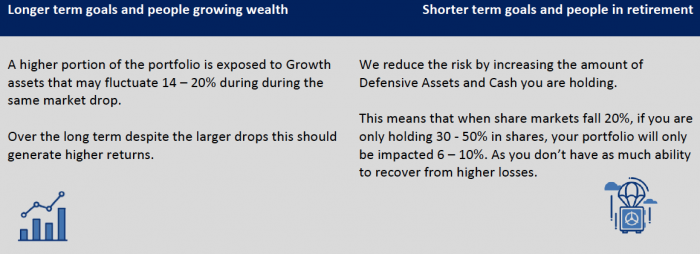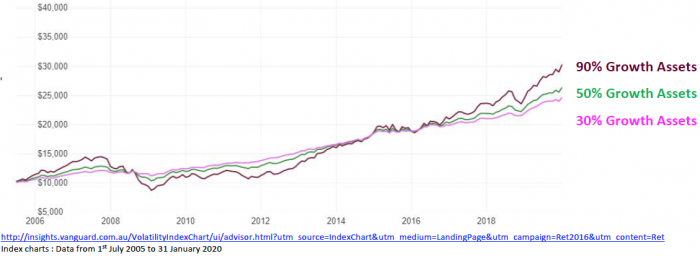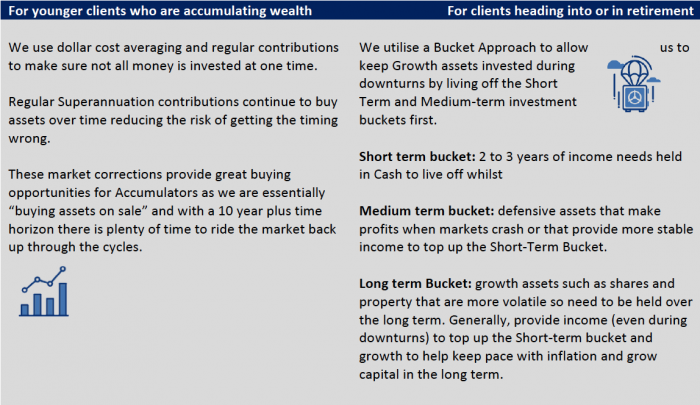With the heightened media attention and uncertainty around the coronavirus, not surprisingly, we have had many clients call and email us, concerned about their investments and wondering how to react.
We wanted to take this opportunity to share our views and provide some investment reassurance about how these types of shocks are dealt with in your investment strategy.
What We See Happening
As you are all aware the spread of the novel coronavirus (COVID-19) continues to escalate outside China despite the concerted efforts of many governments, communities and the World Health Organisation (WHO). Overnight the WHO declared COVID-19 as a global pandemic. This is the official recognition of the severity and risk the disease poses to the global population.
There has been considerable commentary comparing COVID-19 to the normal Flu season, and while on the face of it the fatalities are not markedly different, COVID-19 is proving to be very contagious and has a significantly higher mortality rate with the old, the infirm and the very young. So, while the risk to the young and/or healthy is well below 1%, it is the contagion risk to the more vulnerable groups of society that has exacerbated the risk posed by COVID-19 and hence the magnitude of the global response. In addition to the declaration of COVID-19 as a global pandemic, President Trump’s announcement this morning banning all travel from mainland Europe to the US for 30 days and the overall panic-driven behaviour in our society further contribute to the potential large-scale impact of COVID-19.
The rapid spread of the virus and the escalation of the containment measures, such as the ongoing closure of workplaces and schools, the imposition of travel bans, and other related restrictions, have already had an economic and social impact. Developed world share markets are now in bear market territory (a fall from a recent high of over 20%) and quite reasonably people are worried and looking for guidance.
Looking forward, we envisage that a positive initial step to restoring community and market confidence would involve pivoting from focusing on containment (which is impossible) to concentrating efforts on preparing the healthcare sector to treat the virus symptoms and educating the general population against the media hype. As cases are recorded, factual data will become evident and this will very likely confirm the same impact as China has experienced over the preceding months – ie, NOT the global catastrophe the media is fuelling.
Work also continues on trialling drugs in the search for the blockbuster antiviral (results expected over the coming months for the most advanced potential treatments). A positive result on this front could be a game changer.
As we have stated in previous communications, we have no crystal ball and after two weeks of heightened uncertainty there is no apparent end in sight. But this will end at some point, though we expect it to get worse before it starts to get better – but get better it will.
How Is My Portfolio Managed To Deal With A Crisis?
We do not know what will happen in the short term. However, we expect that, just like every single time before throughout global history, the world will find a way to overcome this problem and life will go on.
Based upon our long experience with such events, we are totally comfortable in our investment management methodology. We are confident that, although there will be volatility, fear, greed and many ups and downs, that our client investments – by the nature of what they are and how they have been deployed – will endure through this until the coronavirus issues are fully resolved.
It is important to remember that the starting point for our management is that we fully expect events like this to occur from time to time. It is a certain fact of life when investing. As such, our management is designed not so much for the good times, but rather for uncertain times like we have now.
To reiterate, the current conditions represent “business as usual” for us and the key to our investment strategy is to be invested in such a way that we can ‘calmly navigate through’ any short-term storm.
The strength of our management confidence stems from the two key pillars – our Investment Philosophy and our Investment Implementation.
Our Investment Philosophy & How It Is Implemented For You
Merideon’s Investment Philosophy is in essence our investment plan and strategy. It reflects the underlying investment structuring which we have proven to withstand the test of all market conditions.
1. Diversification:
Involves spreading investments across many investable areas so all your eggs are not in one basket. In times of volatility, it is difficult to tell which investments will do well and which will do poorly so diversification ensures a counter-balance of growth and defense.
Firstly, we diversify across all the major asset classes (Australian Shares, International Shares, Property & Infrastructure, Fixed & Floating Income, Cash and Alternatives).
Secondly, we diversify using a range of investments to gain exposure to each of the above asset classes.
2. Risk Profiling and Dynamic Asset Allocation:
At the core of every investment strategy we implement for clients is determining the appropriate amount of risk the investment should be taking depending on the goal and timeframe for the money.
Over the last few years as markets have continued to reach higher levels, our allocation to Growth assets has been reduced across all Risk profiles to reduce the risk in our clients’ portfolios.
As you can see from the below chart, the more defensive assets in your portfolio, the smoother the ride.
3. Reduce Timing Risk:
Nobody has a crystal ball, so it is impossible to pick the top (best time to sell) and bottom (best time to buy) investments. Research has shown that being out of the market at the wrong times has a bigger impact on long term returns than experience market corrections.
The key factor with investing in growth assets is to have time to recover from shocks. As we know shocks will occur quite regularly (to differing levels), we plan for them.
4. Quality Investments:
By restricting our investment to predominantly the largest companies, we ensure that our investments can withstand short term shocks such as the current virus.
5. Core Satellite approach:
This approach blends low cost well diversified Index Funds with quality, actively managed investments. Index funds spread your money across all the largest blue-chip investments in a certain category whilst Actively managed funds provide opportunities to trade volatility, adjust asset allocation and provide risk management on a day to day basis.
Within your portfolio, the Active Managers are assessing the situation and making decisions about what assets to buy and sell on a day to day basis based on their style. We note many of these are holding higher if not highest level of cash permissible under their mandates and waiting for opportunities to buy quality assets at lower prices during this crisis to profit from when things turn around.
Typically, active managers outperform indices in falling markets because of the positive relative contribution of the cash holding and their tendency to avoid the worst performing stocks through their selection processes. While this approach, and most others, are challenged by the current environment, it is nonetheless an approach that incorporates consideration of market volatility in the portfolio construction.
By utilising these managers, it means you do not need to act on changing your portfolio during sharp downturns or highly positive markets.
Conclusion – Stay Calm and Carry On
Many are worried about the capital in their portfolios and that is completely understandable. There is no doubt that in aggregate, corporate earnings have been negatively impacted by this event. Market reactions have in part reflected this but also expressed the panic and fear of many investors (think about the Toilet Paper Crisis for context).
What history has shown us from an investment perspective is that having the correct Strategy in place for your goals and holding the course at times like this, while uncomfortable, has over the longer term proven to be best. And in the absence of reliable foresight we believe, as uncomfortable as it is at this point, maintaining your strategy and rebalancing to your respective risk profile asset allocation remains appropriate, as it is a proven process.
Finally, we hope that you and your loved ones manage to avoid COVID-19 and that our community and markets can return to normal as soon as possible.
As always we are here to help and listen to your concerns. Feel free to give your adviser a call at the office on 08 9583 5299 or email us.



